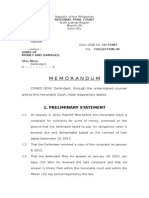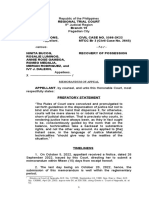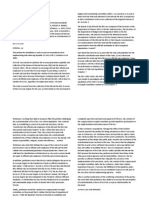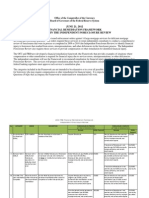100%(6)100% found this document useful (6 votes)
4K viewsAppellee's Memorandum
Appellee's Memorandum
Uploaded by
amun dinThe defendant-appellee argues that the plaintiff-appellant cannot avail of the provisions of Rule 70 regarding forcible entry cases because such cases cannot involve issues of ownership. The defendant-appellee claims that he has registered ownership documents for the property, including a tax declaration and affidavit of ownership registered with the municipal assessor, which indicate he is the rightful owner. Therefore, the municipal trial court did not have proper jurisdiction to hear the case and correctly dismissed the complaint.
Copyright:
© All Rights Reserved
Available Formats
Download as DOCX, PDF, TXT or read online from Scribd
Appellee's Memorandum
Appellee's Memorandum
Uploaded by
amun din100%(6)100% found this document useful (6 votes)
4K views11 pagesThe defendant-appellee argues that the plaintiff-appellant cannot avail of the provisions of Rule 70 regarding forcible entry cases because such cases cannot involve issues of ownership. The defendant-appellee claims that he has registered ownership documents for the property, including a tax declaration and affidavit of ownership registered with the municipal assessor, which indicate he is the rightful owner. Therefore, the municipal trial court did not have proper jurisdiction to hear the case and correctly dismissed the complaint.
Original Description:
Memorandum
Copyright
© © All Rights Reserved
Available Formats
DOCX, PDF, TXT or read online from Scribd
Share this document
Did you find this document useful?
Is this content inappropriate?
The defendant-appellee argues that the plaintiff-appellant cannot avail of the provisions of Rule 70 regarding forcible entry cases because such cases cannot involve issues of ownership. The defendant-appellee claims that he has registered ownership documents for the property, including a tax declaration and affidavit of ownership registered with the municipal assessor, which indicate he is the rightful owner. Therefore, the municipal trial court did not have proper jurisdiction to hear the case and correctly dismissed the complaint.
Copyright:
© All Rights Reserved
Available Formats
Download as DOCX, PDF, TXT or read online from Scribd
Download as docx, pdf, or txt
100%(6)100% found this document useful (6 votes)
4K views11 pagesAppellee's Memorandum
Appellee's Memorandum
Uploaded by
amun dinThe defendant-appellee argues that the plaintiff-appellant cannot avail of the provisions of Rule 70 regarding forcible entry cases because such cases cannot involve issues of ownership. The defendant-appellee claims that he has registered ownership documents for the property, including a tax declaration and affidavit of ownership registered with the municipal assessor, which indicate he is the rightful owner. Therefore, the municipal trial court did not have proper jurisdiction to hear the case and correctly dismissed the complaint.
Copyright:
© All Rights Reserved
Available Formats
Download as DOCX, PDF, TXT or read online from Scribd
Download as docx, pdf, or txt
You are on page 1of 11
At a glance
Powered by AI
The case discusses a property dispute between Ramon Nieto and Keith Ilagan over possession of a parcel of land in Cainta, Rizal. Nieto claims he owns the land based on documents of sale and tax declarations, while Ilagan claims he has been occupying the land since 2009 when his previous home was destroyed.
The defendant Keith Ilagan claims that he started occupying the disputed land in October 2009 after his previous home was destroyed by a typhoon. He argues that at the time the land was unoccupied and there were no signs it belonged to the plaintiff.
The defendant lists his counter statements of facts which include that the land was unoccupied when he moved there in 2009, there were no fences or structures indicating ownership by the plaintiff, and he has been occupying it since.
REPUBLIC OF THE PHILIPPINES
FOURTH JUDICIAL REGION
REGIONAL TRIAL COURT
BRANCH 70
RIZAL
RAMON NIETO
Plaintiff-Appellant,
-versus- Civil Case No. 100-2013
For: Forcible Entry
(Ejectment)
KEITH ILAGAN
Defendant-Appellee,
x----------------------------------------------------------x
APPELLEES MEMURANDUM
Defendant-Appellee KEITH ILAGAN, by undersigned counsel and to
this Honorable Court, in answer to the allegations raised by the Plaintiff-
Appellant in his Memorandum, respectfully states:
PREPARATORY STATEMENT
The appealed case steamed from an ejectment case filed by Plaintiff
Ramon Nieto (Plaintiff-Appellant), which sought to recover the material
possession of a parcel of land against Defendant Keith Santos (Defendant-
Appellees Memorandum
Nieto vs. Ilagan
Civil Case No. 100-2013
Page 2 of 11
Appellee) with the Municipal Trial Court (MTC) of Cainta Rizal therein
docketed as Civil Case No. 100-2013. On February 11, 2014, the Municipal
Trial Court of Cainta rendered the decision dismissing the complaint.
Plaintiff aggrieved with the dismissal of the case filed a Notice of Appeal on
April 15, 2014. Hence, this memorandum in response to the memorandum
filed by the Plaintiff-Appellant.
COUNTER STATEMENTS OF FACTS
1. Plaintiff-Appellant, Ramon Nieto, claims to be the lawful owner of a
parcel of commercial/residential land consisting of 1,200 sq. m., more
or less, that is located in San Andres, Cainta, Rizal. He acquired title
over the said land in 1985, by way of absolute sale from the previous
owner thereof, STEVE ONA, as shown by the Deed of Absolute Sale,
a copy of which is marked as Exhibit A. The said land is not
covered by a Torrens certificate of title.
2. That As a result of the sale, Plaintiff-Appellant was issued Tax
Declaration No. 11111-1985, a copy of which is marked as Exhibit
B, as well as official receipts evidencing the payment of real property
taxes from 1985 up to 2012, copies of which are marked as Exhibit
C and Exhibit C-1 to 27 .
3. Plaintiff-Appellant then planted trees and other plants on the property.
He also erected a perimeter fence around the premises. In January
2009, he also built a 1-room nipa hut, which since then he occupied
from time to time.
4. Sometime in July 2009, Plaintiff-Appellant went to Singapore, Hong
Kong, Malaysia, Japan and Vietnam for an extended vacation. Upon
his return in December 2012, Plaintiff-Appellant went to visit his
Appellees Memorandum
Nieto vs. Ilagan
Civil Case No. 100-2013
Page 3 of 11
property in San Andres, Cainta, Rizal. He then discovered that
Defendant-Appellee was occupying the subject property.
5. Plaintiff-Appellant thereupon demanded from Defendant-Appellee to
vacate the subject premises. The Defendant-Appellee did not heed
said demand. Plaintiff-Appellant again sent another demand in March
2013, as shown by a copy of the letter dated March 3, 2013, a copy of
which is marked as Exhibit D. The Defendant-Appellee also did
not heed this later demand.
6. Due to Defendant-Appellees failure to heed the demand letters sent by
Plaintiff-Appellant, the latter filed the Complaint for Forcible Entry
with prayer to wit:
"x x x that Judgment be rendered ordering the defendant
KEITH ILAGAN to peaceably turn over the physical
possession of the subject property to plaintiff RAMON
NIETO; that defendant be directed to pay plaintiff the sum
of P3,000.00 as reasonable compensation for the use of the
subject property, for every month starting February 2013
until the plaintiff is actually restored to the physical
possession of the property; and that defendant be
commanded to remove any and improvements he erected
on the property."
7. The answer was filed by Keith Ilagan in due time and materially
alleges that he started occupying the subject premises in October
2009, after a storm (Typhoon Ondoy) destroyed his house in San
Isidro, Cainta, Rizal.
Appellees Memorandum
Nieto vs. Ilagan
Civil Case No. 100-2013
Page 4 of 11
8. At that time, the subject premises were not occupied or claimed by any
person, including the plaintiff. In fact, there was nothing in the said
premises that indicated that the plaintiff owns the subject property.
There was no fence to enclose the property. There were no structures
erected thereat, not even those mentioned by the plaintiff in his
complaint.
9. The defendant declared the property for taxation purposes in October
2009, as shown by Tax Declaration No. 2000-2009, a copy of which
is attached and marked as Exhibit 1. Said tax declaration shows that
the property has a market value of P 850,000.00. He also paid real
property taxes in 2009, 2010, 2011 and 2012, as shown by the official
receipts attached and marked as Exhibits 2-5. The defendant
likewise registered with the Municipal Assessor of Cainta, Rizal, and
an Affidavit of Ownership over the subject premises, a copy of which
is attached and marked as Exhibit 6.
10. Defendant contends that plaintiff has no right to claim the property,
much less oust the defendant from the possession thereof.
11. Defendant likewise prayed for the dismissal of the complaint.
DECISION OF THE MTC
On April 11, 2014, the Municipal Trial Court of Cainta rendered a
decision which dismissed the complaint (page 7, Decision). In dismissing
the complaint, the MTC found that plaintiff cannot avail himself of the
provisions of Rule 70 of the Rules of Court, because an ejectment case
should not involve ownership issues. (page 3, Decision); that even assuming
that the plaintiff can raise the issue of ownership, the trial court has no
jurisdiction to resolve the same, since the property has a market value of P
850,000.00 ( page 4 Decision); that even if the trial court has jurisdiction to
decide the respective claims of ownership of the parties, it would appear that
defendant Keith Ilagan is the owner of the subject premises, because he has
Appellees Memorandum
Nieto vs. Ilagan
Civil Case No. 100-2013
Page 5 of 11
an affidavit of ownership that was duly registered with the Municipal
Assessor of Cainta, Rizal ( page 4, Decision).
COUNTER-ARGUMENTS
Defendant-appellee raises the following counter-arguments to the
assignment of errors raised by the Plaintiff-appellant:
I. The Plaintiff-Appellant
cannot avail of the
provisions of Rule 70 of
the Rules of Court.
Thus, the lower court
has no Jurisdiction to
hear and decide the
case on the merits.
There is forcible entry or desahucio when one is deprived of physical
possession of land or building by means of force, intimidation, threat,
strategy or stealth. In such cases, the possession is illegal from the
beginning and the basic inquiry centers on who has the prior possession de
facto; any of the parties who can prove prior possession de facto may
recover such possession even from the owner himself since such cases
proceed independently of any claim of ownership and the plaintiff needs
merely to prove prior possession de facto and undue deprivation thereof.
1
Section 1 of Rule 70 of the Rules of Court tells us the two mandatory
allegations in filling forcible entry cases for the municipal trial court to
acquire jurisdiction, to wit:
1
Munoz v. Yabut, G. R. No. 142676, June 6, 2011
Appellees Memorandum
Nieto vs. Ilagan
Civil Case No. 100-2013
Page 6 of 11
Sec. 1. Who may institute proceedings, and when. Subject to
the provision of the next succeeding section, a person deprived of the
possession of any land or building by force, intimidation, threat,
strategy, or stealth, or a lessor, vendor, vendee, or other person
against whom the possession of any land or building is unlawfully
withheld after the expiration or termination of the right to hold
possession, by virtue of any contract, express or implied, or the legal
representatives or assigns of any such lessor, vendor, vendee, or other
person, may, at any time within one (1) year after such unlawful
deprivation or withholding of possession, bring an action in the proper
Municipal Trial Court against the person or persons unlawfully
withholding or depriving of possession, or any person or persons
claiming under them, for the restitution of such possession, together
with damages and costs.
In the case of Abad v Farrales,
2
the Supreme Court explained the two
mandatory allegations required in filing forcible entry cases, that:
Two allegations are mandatory for the municipal court to
acquire jurisdiction: First, the plaintiff has prior physical possession
of the property. Second, the defendant deprived him of such
possession by force, intimidation, threats, strategy, and stealth.
As alleged in the Complaint, Plaintiff-Appellant had prior physical
possession of the property as evidenced by the fact of planting trees and
other plants and erecting a perimeter fence on the premises. Further,
sometime in January 2009, he also built a 1-room nipa hut, which since then
he occupied from time to time.
However the second requirement that the defendant deprived him of
such possession by force, intimidation, threats, strategy, and stealth was
missing. The plaintiff-appellant failed to allege that defendant Keith Ilagan
deprived him of such possession under the circumstances required by the
law.
2
Abad v. Farrales, G.R. No. 178635, April 11 : 2011
Appellees Memorandum
Nieto vs. Ilagan
Civil Case No. 100-2013
Page 7 of 11
Further, it is not enough of course that the allegations of the complaint
make out a case of forcible-entry. The plaintiff must also able to prove his
allegation that he had prior physical possession that gives him the security
that entitles him to remain in the property until a person with a better right
lawfully ejects him.
3
Here, the Plaintiff-appellant failed to prove that he had prior physical
possession over the disputed property. The alleged prior physical possession
of plaintiff is a self-serving claim because it was not supported by any
evidences. Whereas the defendant sufficiently prove that he has prior
physical possession over the disputed property as shown by the Tax
Declaration No. 2000-2009, the official receipts of the real property taxes in
2009,2010, 2011 and 2012 paid by the defendant, and the duly registered
Affidavit of Ownership.
Accordingly, the Municipal Trial Court of Cainta did not erred in
dismissing the complaint of the plaintiff because of his failure to allege the
two mandatory required allegations in forcible entry cases so that the MTC
acquired jurisdiction over the case.
II. Even assuming that the
MTC has Jurisdiction
over the complaint still
there was necessity to
determine the
ownership of the
subject property.
The defendant-Appellee agree with the Plaintiff-Appellant that in
ejectment suits the only issue for resolution is the physical or material
possession of property involved independent of any claim of ownership by
3
Abad v. Farrales, G.R. No. 178635, April 11 : 2011
Appellees Memorandum
Nieto vs. Ilagan
Civil Case No. 100-2013
Page 8 of 11
any of the party litigants. However, this recognized rule is not absolute
because when the defendant raises in his pleadings the issue of ownership
as defense and the question of who has the prior physical possession cannot
be determined without deciding the issue of ownership the court of first
level may determine the issue of ownership. Rule 70 of the Rules of Court
Section 16 specifically provides:
Sec. 16. Resolving defense of ownership. When the defendant raises the defense
of ownership in his pleadings and the question of possession cannot be resolved without
deciding the issue of ownership, the issue of ownership shall be resolved only to
determine the issue of possession.
Also, the Supreme Court in Gustilo v. Gustilo ruled that:
The Court has ruled in the past that an action to recover possession
is a plenary action in an ordinary civil proceeding to determine the better
and legal right to possess, independently of title. But where the parties raise
the issue of ownership, as in this case, the courts may pass upon such issue
to determine who between the parties has the right to possess the property.
This adjudication, however, is not final and binding as regards the issue of
ownership; it is merely for the purpose of resolving the issue of possession
when it is inseparably connected to the issue of ownership. The
adjudication on the issue of ownership, being provisional, is not a bar to an
action between the same parties involving title to the property.
4
From the above-quoted rule and the jurisprudence decided by the
Supreme Court that there is necessity in determining the issue of ownership
of the subject property when the defendant raises the issue of ownership as
defense in his pleadings. In defendants Answer he raised the issue of
ownership over the disputed property.
4
Gustilov Gustilo, G.R. No 175497, October 19, 2011
Appellees Memorandum
Nieto vs. Ilagan
Civil Case No. 100-2013
Page 9 of 11
Hence, the MTC is still allowed assuming that it has jurisdiction to
determine the issue of who between the party litigants is the owner of the
property but only for the purpose of determining the issue of who has the
prior possession over the subject property.
III. Assuming that the MTC
has jurisdiction to
resolve the Complaint.
The amount of the
property is
P850,000.00
As previously discussed from the preceding paragraph the MTC did
not erred in dismissing the case for lack of jurisdiction. Even assuming that
it has jurisdiction the cause of action of plaintiff is not for forcible entry
cases but an ordinary civil action involving possession over the disputed
property. The MTC has still without jurisdiction to the complaint
because Section 33 of Batas Pambansa Blg. 129, as amended by Republic
Act No. 7691, states:
(1) x x x x
(2) x x x x
(3) Exclusive original jurisdiction in all civil actions which
involve title to, or possession of, real property, or any interest therein
where the assessed value of the property or interest therein does not
exceed Twenty thousand pesos (P20,000.00) or, in civil actions in Metro
Manila, where such assessed value does not exceed Fifty thousand pesos
(P50,000.00) exclusive of interest, damages of whatever kind, attorney's
fees, litigation expenses and costs: Provided, That in cases of land not
Appellees Memorandum
Nieto vs. Ilagan
Civil Case No. 100-2013
Page 10 of 11
declared for taxation purposes, the value of such property shall be
determined by the assessed value of the adjacent lots."
Consequently, the MTC has jurisdiction over the claim of
possession if the jurisdictional amount required by the law is not
beyond the limit allowed. However, plaintiff-appellants claim does
not fall within the jurisdictional amount required by the law.
Therefore, the complaint must be dismissed.
PRAYER
WHEREFORE, premises considered, it is humbly prayed of this
Honorable Court that the Decision dated 11 April 2014 of the court a quo be
affirmed and that this appeal be dismissed.
Other reliefs just and equitable under the premises are likewise prayed
for.
Quezon City for Rizal, 16 May 2014.
ATTY. MAESHACH M. SOMBILON
Counsel for Defendant-Appellee
Atty. Roll. No. 52284
IBP Lifetime No. 11087/Quezon City
PRT No. 1102584/01-05-14-Quezon City
MCLE Exemption No. 111-042386
Appellees Memorandum
Nieto vs. Ilagan
Civil Case No. 100-2013
Page 11 of 11
Copy Furnished:
Atty. Marie Dianne V. Espiritu
Jhocson Espiritu Karim Law
Counsel for Petitioner
27
th
Floor Trafalgar Bldg.
888 HV Dela Costa St., Makati city
WRITTEN EXPLANATION
(Pursuant to Section 11, Rule 13
1997 Rules of Civil Procedure)
Filing and service of this Memorandum of Appeal to the above-
mentioned parties was accomplished through registered mail since personal
service could not be effected due to the distance between the parties, and the
heavy volume of deliveries of the messengers of the law firm of the
undersigned counsel.
ATTY. MAESHACH M. SOMBI LON
You might also like
- Sample Comment Opposition To MRDocument4 pagesSample Comment Opposition To MRBng Gsn86% (7)
- Appellee's MemorandumDocument5 pagesAppellee's MemorandumJiselle Rae Aumentado Villamor81% (16)
- Position Paper For Plaintiff (Ejectment Case)Document8 pagesPosition Paper For Plaintiff (Ejectment Case)Aldrin Loyola100% (9)
- Appeal MemorandumDocument10 pagesAppeal MemorandumDiana Boado100% (8)
- Comment To Petition For ReviewDocument3 pagesComment To Petition For ReviewVincent Quiña Piga88% (8)
- Petition For Review Under Rule 42Document10 pagesPetition For Review Under Rule 42apbuera100% (4)
- Petition For Review Rule 42Document9 pagesPetition For Review Rule 42Vincent Quiña Piga100% (16)
- Sample Indirect ContemptDocument4 pagesSample Indirect ContemptKristianly Hazel Esclares75% (4)
- Memorandum For DefendantDocument7 pagesMemorandum For Defendantfuckvinaahhh100% (2)
- Motion To Lift Order of Default and Admit Motion To Dismiss With Counter-ClaimDocument5 pagesMotion To Lift Order of Default and Admit Motion To Dismiss With Counter-ClaimRhei Barba0% (1)
- Motion For DemolitionDocument2 pagesMotion For DemolitionMarie Jade Ebol Araneta89% (9)
- Comment On Motion For Reconsideration and DismissalDocument13 pagesComment On Motion For Reconsideration and Dismissaljason14dizon92% (12)
- Motion For Extension To File Defendants-Appellants BriefDocument3 pagesMotion For Extension To File Defendants-Appellants BriefTrisha Faith Balido Pagara100% (2)
- Motion To Hear Affirmative DefenseslDocument6 pagesMotion To Hear Affirmative DefenseslLothy Ginipal RotellacNo ratings yet
- Motion For Issuance of Writ of Execution SampleDocument5 pagesMotion For Issuance of Writ of Execution SampleCoreine Imee Valledor70% (10)
- Motion To Fix Supersedeas Bond To Stay Execution-Seguro vs. BaloranDocument2 pagesMotion To Fix Supersedeas Bond To Stay Execution-Seguro vs. BaloranConsigliere Tadili83% (6)
- Motion To Defer ProceedingsDocument3 pagesMotion To Defer ProceedingsMichelle Ricaza-Acosta70% (10)
- A Treatise On Equitable Remedies: Pomeroys Equity JurisprudenceDocument980 pagesA Treatise On Equitable Remedies: Pomeroys Equity JurisprudenceTuriyan Gold100% (13)
- Memorandum AppealDocument6 pagesMemorandum AppealKevin Gaffud Villamor0% (1)
- Memorandum of Appeal-AppelleeDocument11 pagesMemorandum of Appeal-AppelleeLucille Teves100% (5)
- Petition For Review Rule 45Document8 pagesPetition For Review Rule 45Vincent Quiña Piga100% (7)
- Motion For Leave of Court To Serve Summons by PublicationDocument2 pagesMotion For Leave of Court To Serve Summons by PublicationNicole Santoalla50% (2)
- Memo Appeal RTC EjectmentDocument11 pagesMemo Appeal RTC EjectmentShelamarie M. Beltran100% (5)
- Memorandum of Appeal Dar SampleDocument18 pagesMemorandum of Appeal Dar Samplesandwichmonster100% (6)
- Memorandum BP 22 ProsecutionDocument5 pagesMemorandum BP 22 ProsecutionBuen Libetario100% (2)
- Appellees' BriefDocument22 pagesAppellees' BriefGerard Nelson Manalo100% (2)
- Position Paper For The Defendant - Ejectment - Rolly & Rufina BitoDocument15 pagesPosition Paper For The Defendant - Ejectment - Rolly & Rufina BitoBoom Manuel100% (20)
- Sample Urgent Motion To Resolve TRODocument10 pagesSample Urgent Motion To Resolve TROJat Tabamo100% (3)
- Special Writ of DemolitionDocument2 pagesSpecial Writ of Demolitionapbacani100% (1)
- Motion For ReconsiderationDocument8 pagesMotion For ReconsiderationDiaz100% (1)
- MemorandumDocument9 pagesMemorandumMaria Lourdes P. Garcia100% (1)
- Comment Opposition To The Petition Certiorari Asialink V Madriaga SCDocument20 pagesComment Opposition To The Petition Certiorari Asialink V Madriaga SCDence Cris Rondon100% (4)
- Petition For Annulment of JudgementDocument3 pagesPetition For Annulment of JudgementBret Monsanto100% (2)
- Appeal Memorandum - Labos Adona DarabDocument13 pagesAppeal Memorandum - Labos Adona DarabDon SumiogNo ratings yet
- Rule 42 - Petition For Review From The RTC To The CADocument5 pagesRule 42 - Petition For Review From The RTC To The CAAnonymous GMUQYq850% (2)
- Motion For Extension of Time To File MemorandumDocument4 pagesMotion For Extension of Time To File MemorandumChemLloydL.Signapan50% (2)
- Appeal Memorandum - Secretaria Vs Betita - RTC11Document16 pagesAppeal Memorandum - Secretaria Vs Betita - RTC11Karen Cate Ilagan Pinto100% (2)
- Preliminary Conference Order - FinalDocument3 pagesPreliminary Conference Order - Finalamun dinNo ratings yet
- FRIA Flow Chart FinalDocument44 pagesFRIA Flow Chart Finalamun din78% (9)
- Memorandum of AppealDocument6 pagesMemorandum of Appealonin comahig100% (1)
- Memorandum of Appeal - HyronsDocument5 pagesMemorandum of Appeal - HyronsErik PeraltaNo ratings yet
- Metropolitan Trial Court: Plaintiff, - VersusDocument3 pagesMetropolitan Trial Court: Plaintiff, - VersusClar Napa0% (1)
- Oppositon To Petition For ReviewDocument19 pagesOppositon To Petition For ReviewDebie Sallidao Tay-ogNo ratings yet
- Complaint With Prayer For Injunctive ReliefDocument4 pagesComplaint With Prayer For Injunctive ReliefReen Dos100% (3)
- Appellant's BriefDocument37 pagesAppellant's BriefGrebert Karl Jennelyn Sison100% (14)
- Republic of The Philippines - : Plaintiff-AppellantDocument16 pagesRepublic of The Philippines - : Plaintiff-AppellantLawrence Villamar100% (1)
- Appellees Brief Asialink V MadriagaDocument53 pagesAppellees Brief Asialink V MadriagaDence Cris RondonNo ratings yet
- Motion Writ of PossessionDocument4 pagesMotion Writ of PossessionEdward Qarino100% (1)
- Appellee's Brief - Paronda vs. SalazarDocument22 pagesAppellee's Brief - Paronda vs. SalazarFrançois HollandeNo ratings yet
- Motion For Extension of Time SampleDocument4 pagesMotion For Extension of Time SampleMichael Parreño Villagracia75% (4)
- Motion For ReconsiderationDocument5 pagesMotion For Reconsiderationonin comahig100% (1)
- Rule 43 CommentDocument5 pagesRule 43 CommentGenesis IraoNo ratings yet
- Motion For Leave of Court For Extraterritorial Service of SummonDocument2 pagesMotion For Leave of Court For Extraterritorial Service of SummonnesliebarramedaNo ratings yet
- Petition For ReviewDocument9 pagesPetition For ReviewRenzo Beaver Baco BalberonaNo ratings yet
- Motion To InhibitDocument2 pagesMotion To InhibitDrekyrie Rosenving100% (2)
- Motion For Leave To File Rejoinder With RejoinderDocument2 pagesMotion For Leave To File Rejoinder With RejoinderHiero Phant100% (1)
- Motion For Reconsideration (Prosecutor Level)Document5 pagesMotion For Reconsideration (Prosecutor Level)Darwin Charles ZamboNo ratings yet
- Petition For Review On Certiorari 45Document5 pagesPetition For Review On Certiorari 45Jan Lawrence Olaco100% (2)
- Motion For Reconsideration (Rembulat v. Rembulat)Document9 pagesMotion For Reconsideration (Rembulat v. Rembulat)cagayatNo ratings yet
- Motion For ReconsiderationDocument18 pagesMotion For ReconsiderationJerico GodoyNo ratings yet
- Appellees' MemorandumDocument14 pagesAppellees' MemorandumAristeo C. BernadosNo ratings yet
- Complaint Ejectment (Alterios)Document6 pagesComplaint Ejectment (Alterios)Gabriel SincoNo ratings yet
- G.R. No. 169793 September 15, 2006 Victoriano M. ENCARNACION, Petitioner, NIEVES AMIGO, Respondent. Ynares-Santiago, .Document3 pagesG.R. No. 169793 September 15, 2006 Victoriano M. ENCARNACION, Petitioner, NIEVES AMIGO, Respondent. Ynares-Santiago, .mblopez1No ratings yet
- Legal Ethics DigestDocument30 pagesLegal Ethics Digestamun dinNo ratings yet
- Problem Areas in Legal EthicsDocument18 pagesProblem Areas in Legal Ethicsamun dinNo ratings yet
- Power of Judicial ReviewDocument75 pagesPower of Judicial Reviewamun din100% (1)
- Ornum Vs LasalaDocument2 pagesOrnum Vs Lasalaamun dinNo ratings yet
- Banking and Allied Laws ReviewerDocument25 pagesBanking and Allied Laws Revieweramun dinNo ratings yet
- Criminal Law Review Syllabus Prosec. GarciaDocument22 pagesCriminal Law Review Syllabus Prosec. Garciaamun din100% (2)
- House of Representatives Marcos V ComelecDocument83 pagesHouse of Representatives Marcos V Comelecamun dinNo ratings yet
- Answer Habeas Corpus Ayson Baker Kapunan Laidan TigsonDocument3 pagesAnswer Habeas Corpus Ayson Baker Kapunan Laidan Tigsonamun dinNo ratings yet
- 1 FRANCISCO Versus House of RepresentativesDocument235 pages1 FRANCISCO Versus House of Representativesamun dinNo ratings yet
- (G.R. No. 145911. July 7, 2004.) Andy Quelnan, Petitioner, vs. VHF Philippines, Inc. and Vicente T. Tan, Respondents. DecisionDocument6 pages(G.R. No. 145911. July 7, 2004.) Andy Quelnan, Petitioner, vs. VHF Philippines, Inc. and Vicente T. Tan, Respondents. Decisionamun dinNo ratings yet
- Customs Taxation: Syllabus For Taxation II (SY 2013-2014) Atty. Jon LigonDocument1 pageCustoms Taxation: Syllabus For Taxation II (SY 2013-2014) Atty. Jon Ligonamun dinNo ratings yet
- Carriage of Goods by Sea ActDocument22 pagesCarriage of Goods by Sea Actamun dinNo ratings yet
- Fermin Vs PeopleDocument2 pagesFermin Vs Peopleamun dinNo ratings yet
- Abakada Guro Party List V Purisima GR No.166715, Aug. 14, 2008Document16 pagesAbakada Guro Party List V Purisima GR No.166715, Aug. 14, 2008amun dinNo ratings yet
- Offliberty - For Offline PeopleDocument2 pagesOffliberty - For Offline PeopleMiguel LopezNo ratings yet
- Amnestyinternational Kahootquizzes2016 Teacherinstructions Quiz1and2Document12 pagesAmnestyinternational Kahootquizzes2016 Teacherinstructions Quiz1and2viviana rodasNo ratings yet
- Employers Confederation of The PH Vs National Wage and Productivity CommissionDocument3 pagesEmployers Confederation of The PH Vs National Wage and Productivity CommissionCherith Inna MonteroNo ratings yet
- Chaphekar Police InvestigationsDocument52 pagesChaphekar Police InvestigationsKiran KumbharNo ratings yet
- Handouts Theme 2 (ETH100)Document2 pagesHandouts Theme 2 (ETH100)AhmeddedNo ratings yet
- THE ADR CENTER Arbitration Process Flowchart PDFDocument4 pagesTHE ADR CENTER Arbitration Process Flowchart PDFjuvpilapilNo ratings yet
- Grande Vs PatricioDocument2 pagesGrande Vs PatricioCarol Jacinto0% (2)
- LTD Cases Final CoverageDocument6 pagesLTD Cases Final CoverageLaika HernandezNo ratings yet
- Bar MCQDocument27 pagesBar MCQskaccNo ratings yet
- TrivandrumDocument97 pagesTrivandrumMohamed ashiqNo ratings yet
- Causes of French Rev 2Document2 pagesCauses of French Rev 2margajavi2No ratings yet
- Human Rights in The Philippines HXDocument6 pagesHuman Rights in The Philippines HXIrene QuimsonNo ratings yet
- G.R. No. 224210Document5 pagesG.R. No. 224210roigtcNo ratings yet
- (SGC) Minutes of The MeetingDocument4 pages(SGC) Minutes of The MeetingJOHNELL PANGANIBANNo ratings yet
- G.R. NO. 174129, July 5, 2010. Honesto Ferrer, Jr. vs. Mayor Sulpicio Roco, Jr. and Sangguniang Panglungsod of NagaDocument1 pageG.R. NO. 174129, July 5, 2010. Honesto Ferrer, Jr. vs. Mayor Sulpicio Roco, Jr. and Sangguniang Panglungsod of NagagsvgsvNo ratings yet
- Case12 ALCANTARAvCOMMISSION MATOLDocument2 pagesCase12 ALCANTARAvCOMMISSION MATOLGreghvon MatolNo ratings yet
- Financial Remediation FrameworkDocument5 pagesFinancial Remediation FrameworkForeclosure FraudNo ratings yet
- Morales Vs BinayDocument1 pageMorales Vs BinayTitus EdisonNo ratings yet
- PPL Vs MalimitDocument1 pagePPL Vs MalimitRaymarc Elizer AsuncionNo ratings yet
- Yu Con v. IpilDocument4 pagesYu Con v. IpilMay ChanNo ratings yet
- ევროკავშირის პოლიტიკა და ინსტიტუტები (2006), კ. გოგოლაშვილი, ს. კაპანაძეDocument224 pagesევროკავშირის პოლიტიკა და ინსტიტუტები (2006), კ. გოგოლაშვილი, ს. კაპანაძეMagda RukhaiaNo ratings yet
- 03 City of ILOILO V JudgeDocument2 pages03 City of ILOILO V JudgeCedric Enriquez100% (1)
- Manila Standard Today - July 3, 2012 IssueDocument12 pagesManila Standard Today - July 3, 2012 IssueManila Standard TodayNo ratings yet
- Petitioner vs. vs. Respondent: Second DivisionDocument13 pagesPetitioner vs. vs. Respondent: Second DivisionRNJNo ratings yet
- People v. Aruta - CaseDocument16 pagesPeople v. Aruta - CaseRobeh AtudNo ratings yet
- International Steering Group For Kosovo: From Wikipedia, The Free Encyclopedia Jump ToDocument7 pagesInternational Steering Group For Kosovo: From Wikipedia, The Free Encyclopedia Jump ToAnonymous nirGvSNo ratings yet
- Annex "A": Section 1. Title. The Title of This Ordinance Shall Be "AN ORDINANCE TEMPORARILYDocument2 pagesAnnex "A": Section 1. Title. The Title of This Ordinance Shall Be "AN ORDINANCE TEMPORARILYBar2012No ratings yet
- Agreement Between Author and PublisherDocument4 pagesAgreement Between Author and PublisherMUNEEB AKBARNo ratings yet
- Made Easy, Annual Edition 2017Document127 pagesMade Easy, Annual Edition 2017Khan AdilNo ratings yet









































































































